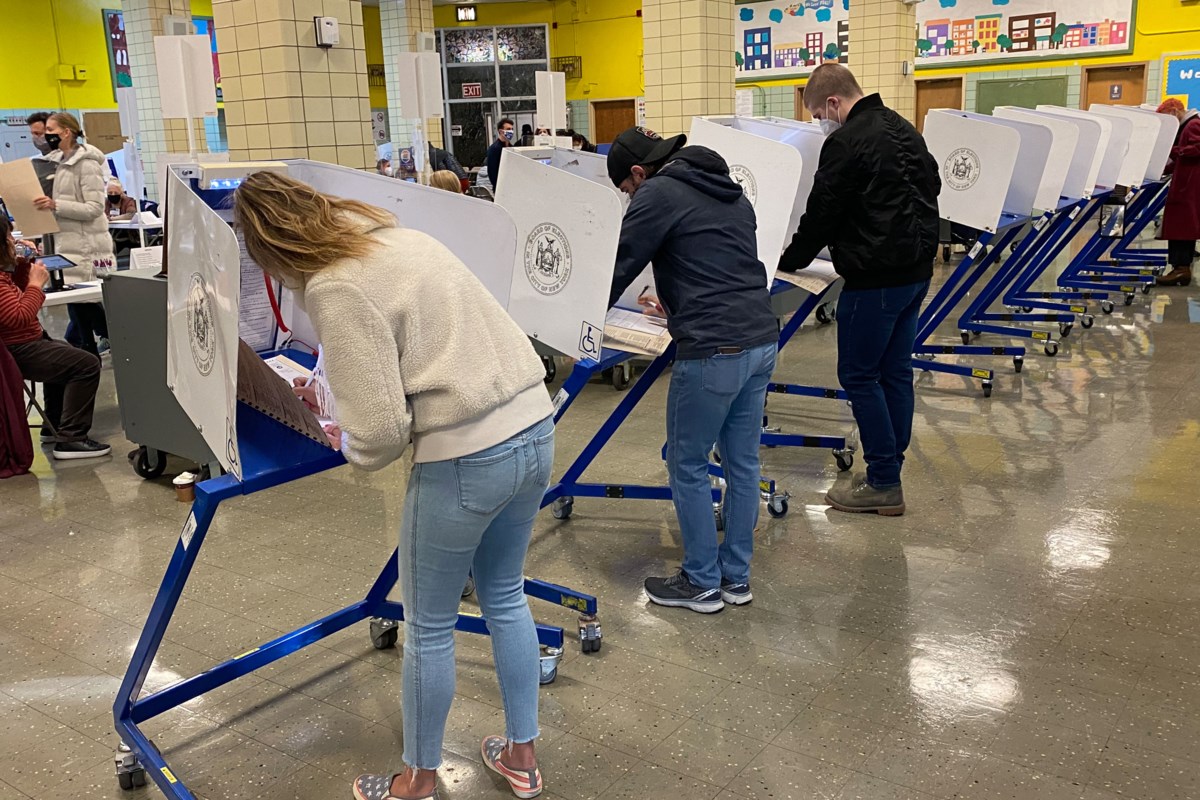Are you ready for a new mayor? Early voting starts on Saturday, Oct. 25.
Early voting starts on Saturday, Oct. 25 and will continue through Sunday, Nov. 2, in the lead-up to Election Day on Tuesday, Nov. 4.
Voters can cast their ballot for the mayor, city council, comptroller, public advocate, borough president and judges. There are also six ballot proposals on the ballot this year.
How To Vote
This is a guide for Brooklyn (Kings County) voters.
To vote by mail, you must request your mail ballot online by Oct. 25. Click here to request your mail-in ballot.
To vote early, between Oct. 25 and Nov. 2, you should look up your poll site as it often differs from the general election poll site and the hours vary each day. Click here to find out when and where you can vote early.
Election Day is Nov. 4. Polls are open from 6:00am to 9:00pm. Click here to check on your polling site.
What Will I Be Voting On?
Mayor
Zohran Mamdani (Democratic/Working Families)
Curtis Sliwa (Republican)
Irene Estrada (Conservative)
Andrew Cuomo (Flight & Deliver)
Joseph Hernandez (Quality of Life)
*Eric Adams and Jim Walden will appear on the ballot but they have both dropped out of the race.
Public Advocate
Jumaane Williams (Democratic, Working Families)
Gonzalo Duran (Republican, Conservative, United Alliance)
Marty Dolan (The Unity)
Comptroller
Mark Levine (Democratic)
Peter Kefalas (Republican, Conservative)
Ismael Perez (The Unity)
Borough President
Antonio Reynoso (Democratic, Working Families)
Janine Acquafredda (Republican, Conservative)
City Council
District 33
Lincoln Restler (Democratic, Working Families)
District 34
Jennifer Gutierrez (Democratic, Working Families)
District 35
Crystal Hudson (Democratic, Working Families)
Benny Rosenberger (Conservative)
Hector Robertson (United Alliance)
District 36
Chi Ossé
District 37
Sandy Nurse
District 38
Alexa Avilés (Democratic, Working Families)
Luis Quero (Republican, Conservative)
District 39
Shahana Hanif (Democratic, Working Families)
Brett Wynkoop (Conservative)
Matthew Morgan (Libertarian)
Nickie Kane (Voters First)
District 40
Rita Joseph (Democratic, Working Families)
District 41
Darlene Mealy (Democratic)
Yehuda Shaffer (United Alliance)
District 42
Chris Banks (Democratic)
Davon Phillips (Freedom)
District 43
Susan Zhuang (Democratic, Conservative)
District 44
Simcha Felder (Democratic, Conservative, Law & Order)
Heshy Tischler (Republican, Trump MAGA)
District 45
Farah Louis (Democratic)
Joshua Diaz (Republican, Conservative)
Hatem El-Gamasy (Safe & Affordable)
District 46
Mercedes Narcisse (Democratic)
Athena Clarke (Republican)
Dimple Willabus (Conservative)
District 47
Kayla Santosuosso (Democratic, Working Families)
George Sarantopoulos (Republican, Conservative)
District 48
Inna Vernikov (Republican, Conservative)
District 50
Radhakrishna Mohan (Democratic)
David Carr (Republican, Conservative)
Ballot Proposals
There are six ballot proposals to vote on. Proposal 1 suggests changes to the state Constitution, while Proposals 2-6 suggest changes to the City Charter. The City Council has urged voters to reject Proposals 2, 3 and 4 as they use “deceptive and inaccurate language making them noncompliant with state law” and essentially strips power from the City Council when affordable housing projects need approval. Read the Council’s reasoning here.
Propsal 1: Amendment to allow Olympic Sports Complex in Essex County on State Forest Perseve Land
Currently there are strict rules for the kinds of construction that are allowed on state-owned and protect forest land. If you vote ‘yes’ to this proposal, it would allow the Olympic Sports Complex in the Adirondack forest preserve to construct new ski trails.
Proposal 2: Fast-Track Affordable Housing to Build More Affordable Housing Across The City
This proposal would incorporate two new processes to fast-track affordable housing projects. Most projects must go through the Uniform Land Use Review Procedure (ULURP), a seven-month process. If you vote yes to this proposal, one review period will be a combination of a 60-day review by the local Community Board and a 30-day review by the Board of Standards and Appeals. The second process would create a faster review for projects in the 12 community districts with the lowest rates of affordable housing. It would allow the Community Board and Borough President to review the project at the same time, followed by a 30- to 45-day review by the City Planning Commission, which would then have the final approval instead of the City Council.
Proposal 3: Simplify Review of Modest Housing and Infrastructure Projects
The proposal would create a faster review process for certain land use projects, including smaller projects and how land is used to prepare for extreme weather. Voting ‘yes’ removes the City Council’s review for most projects. Voting ‘no’ keeps the seven-month public review process from the local Community Board, Borough President, City Planning Commission, City Council and Mayor.
Proposal 4: Establish an Affordable Housing Appeals Board
The proposal would create a Affordable Housing Appeals Board, made up of the Borough President, Speaker of the City Council and Mayor. It would allow the board to reverse the City Council’s decision with a two-to-one vote. Voting ‘yes’ would enable the board to reverse any City Council decisions on affordable housing projects. Voting ‘no’ keeps the current seven-month review process.
Proposal 5: Create a Digital City Map to Modernize City Operations
The proposal asks the Department of City Planning to create, maintain and digitize a single city map. Currently, the city map is an amalgamation of 8,000 paper maps. Voting ‘yes’ creates one centralized digital map. Voting ‘no’ keeps each borough’s paper maps separate and administered by each borough.
Proposal 6: Move Local Elections to Presidential Election Years to Increase Voter Participation
This proposal would move election dates for city officers to the same year as federal presidential elections.
*This proposal would also require a change to state law before it can take effect.

